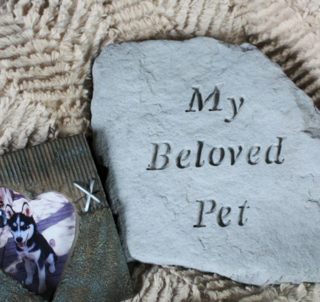Grief
Can Bereaved Pet Owners Suffer Prolonged Grief Disorder?
Why does the new psychiatric grief disorder category exclude pet owners?
Posted March 3, 2022 Reviewed by Vanessa Lancaster
Key points
- The American Psychiatric Association recently recognized "prolonged grief disorder" as a form of mental illness.
- However, this new psychiatric disorder applies only to those who suffer the loss of a beloved "person."
- Every year, hundreds of thousands of individuals may experience long-term debilitating grief following the death of a pet.

At some point, most pet lovers will experience the death of a companion animal, and they will deeply mourn the passing of their furry or feathered friend. As with the loss of a human companion, their grief usually fades in a matter of months.
However, University of Hawaii researchers found that about 4 percent of bereaved pet owners experience extreme and long-lasting grief. In addition, grief associated with the loss of pets can be aggravated by factors that do not apply to human deaths — for example, remorse over the decision to euthanize a pet.
Further, grieving pet owners typically are not given the social support afforded to individuals who lose a close human companion. Indeed, they often report they can’t talk about their grief over the death of their pet for fear of social rejection, shame, and loneliness.
For the first time, in 2021, the American Psychiatric Association officially recognized long-term debilitating grief responses to human death as a form of psychopathology. The organization added a new diagnostic category to the 5th edition of its taxonomy of mental illnesses, the APA’s Diagnostic and Statistical Manual — usually referred to as “the DSM.” The official name of the disorder is “prolonged grief disorder.”
According to the DSM, “Prolonged grief disorder happens when someone loses someone close, and they experience an intense yearning/longing for or preoccupation with the deceased person. Their bereavement lasts longer than social norms dictate and causes distress or problems functioning.”
Can Bereaved Pet Lovers Suffer From Prolonged Grief Disorder?
According to the DSM, however, prolonged grief disorder only occurs in response to the death of a deceased "person.” I recently received an email from a reader named Doug in response to a blog post I had written on pets and human happiness. His letter made me wonder whether the DSM’s definition should be expanded to include some bereaved pet owners. Doug agreed to let me reprint his letter here.
The Letter from Doug On The Death of His Pet
Hi Hal,
I read your post on pets and happiness. I mostly agreed with it—until I decided to put my dog, Charlie, to sleep.
I knew I would feel bad. He was my dog. Well, I guess he was more than my dog, more like a family member. Charlie was with us for 16 years—since he was a puppy. He was in pretty good health up until last summer. Then I noticed he was getting a little more blind, and his hearing was poor.
Sometimes at night, he would howl for what seemed no reason. He loved cherries and Saskatoons. I walked him seven times a day that last few years. We would go up multiple routes, and he would enjoy checking out trees and bushes and anywhere another dog went by. He was very protective. He would bark and growl at other dogs. Over the years, he got more mellow. No barking, no growling. Usually, he just sat down.
On his last day, we took the “Scooter’s last walk” route, and he almost walked the whole way (Scooter was one of my nicknames for him). When I carried him, he wanted down to walk himself because he was so proud.
That was when I made a regrettable decision. Thought it might be better for everyone for Charlie to go to sleep. The minute I made the arrangement, I had a terrible feeling I was making a huge mistake. But for some reason, I didn’t stop it, and Charlie went to sleep forever.
I had uncontrollable sobbing fits multiple times a day for at least three months, and even now—6 months later—I still cry.
People and animals close to me have died. This is different. In every other case, I have worked hard to keep them alive, and they were taken from me. But in this case, I chose to end his life. Killing something is not something you can undo.
Even though I played the event over and over in my mind before it happened, you never know how you are going to feel until it happens. I don’t think I will ever get over it.
When someone decides to take on the responsibility of a pet, cherish them until their end, so you don’t have to feel like me.
Thanks,
Doug
What Is Prolonged Grief Disorder?
By some estimates, as many as 1 in 10 people who lose a close human companion will suffer from prolonged grief disorder, sometimes called “complicated grief.” According to the new DSM guidelines, human grief shifts from “normal” to “prolonged” when the loved one has died at least 12 months earlier for adults and at least six months earlier for children and teens.
The symptoms of prolonged grief disorder include:
- Preoccupation with the death of your loved one.
- Intense sorrow and pain over the loss.
- Inability to accept the death.
- Emotional numbness.
- Experience guilt or self-blame.
- Believing you did something wrong.
- Bitterness at the loss of the companion.
- Impairments of functioning.
Should The Definition of Prolonged Grief Disorder Include Bereaved Pet Owners?
According to the DSM, prolonged grief disorder only occurs in response to “the death of a person who was close to the bereaved.” Bereaved pet owners are omitted. Yet, in a 2020 study of 395 functionally impaired bereaved pet owners published in the journal Psychiatry Research, Sherman Lee found that the patterns of their symptoms were the same as in individuals suffering prolonged grief disorder in response to the loss of a human companion.
In addition, Lee reported that the pet owners who met the criteria for prolonged grief disorder were more likely to suffer from depression, loneliness, sleep difficulties, and drug and alcohol issue. He also found that the clusters of symptoms were essentially the same for men and women.
The issue of whether the American Psychiatric Association should expand the definition of prolonged grief disorder to include severely bereaved pet owners is important. About 60 million dogs live in American homes, and the average canine life span is 12 years.
Even if only 4 percent of pet owners experience debilitating grief when their pet dies, nearly 250,000 individuals a year will be in Doug’s position. Presumably, they could benefit from the same types of treatments that help us cope with the loss of human companions.
Cornell Univerity’s Pet Loss Support Hotline is a valuable resource if you or someone you know needs help dealing with the death of a beloved companion animal (here).
References
Park, R. M., Royal, K. D., & Gruen, M. E. (2021). A Literature Review: Pet Bereavement and Coping Mechanisms. Journal of Applied Animal Welfare Science, 1-15.
Prigerson, H. G., Kakarala, S., Gang, J., & Maciejewski, P. K. (2021). History and status of prolonged grief disorder as a psychiatric diagnosis. Annual review of clinical psychology, 17, 109-126.
Lee, S. A. (2020). Does the DSM-5 grief disorder apply to owners of deceased pets? A psychometric study of impairment during pet loss. Psychiatry Research, 285, 112800.
Adrian, J. A. L., Deliramich, A. N., & Frueh, B. C. (2009). Complicated grief and posttraumatic stress disorder in humans' response to the death of pets/animals. Bulletin of the Menninger Clinic, 73(3), 176-187.




